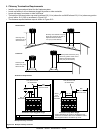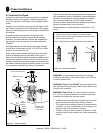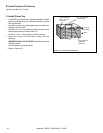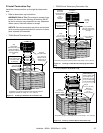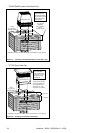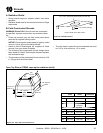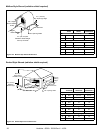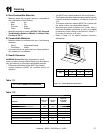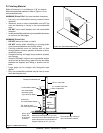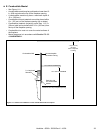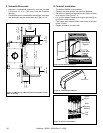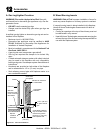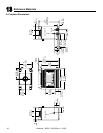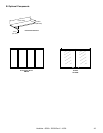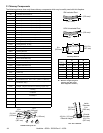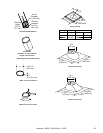
38
D. Finishing Material
Refer to Sections 11.A. and Sections 11.B. for combus-
tible/noncombustible materials. Refer to Figure 11.9 for
noncombustible zone.
WARNING! Risk of Fire!
You must maintain clearances.
• Use only non-combustible framing material below
standoffs.
• Sheetrock, wood or other combustibles must NOT be
used as sheathing or facing in the noncombustible
zone.
• DO NOT cover metal fi replace front with combustible
materials.
• Install combustible materials only to specifi ed clearances
on top front and side edges.
• Complete framing and apply facing material (drywall)
over framing.
• A bead of 300-deg F minimum non-combustible sealant
must be used to close off any gaps at the top and sides
between the fi replace and facing to prevent cold air
leaks.
• Large gaps can be bridged with fiberglass rope
gasket.
• Only non-combustible materials may be used to cover
the metal fi replace front.
WARNING! Risk of Fire!
• DO NOT obstruct air inlets or outlets.
• DO NOT modify grilles. Modifying or covering grilles
could cause temperature rise and fi re hazard.
• Finishing materials must not interfere with: air fl ow
through grilles or louvers; operation of louvers or doors;
access for service.
These surfaces
may be covered
with non-combustible
material.
Non-combustible
sealant.
Figure 11.9 Noncombustible Facing
Metal strips are placed 2 in. (51 mm)
under the front of the fireplace and must
extend beyond the front and sides of
fireplace opening by 2 in. (51 mm)
Continuous,
non-combustible sealant
Floor constructed of wood or
other combustible material
HX3 or HX4
Hearth Ext
or equivilent
insulation
Hearth
Refractory
Finished combustible wall
Combustible material
Non-combustible
decorative facing
(up to full brick depth)
2 x 4 header, flush with
front of stand-offs
Tile, stone or other
non-combustible material
Flat 2 x 4 stud wall
Figure 11.10 Decorative Facing
Heatilator • SC60 • 32838 Rev X • 10/08



